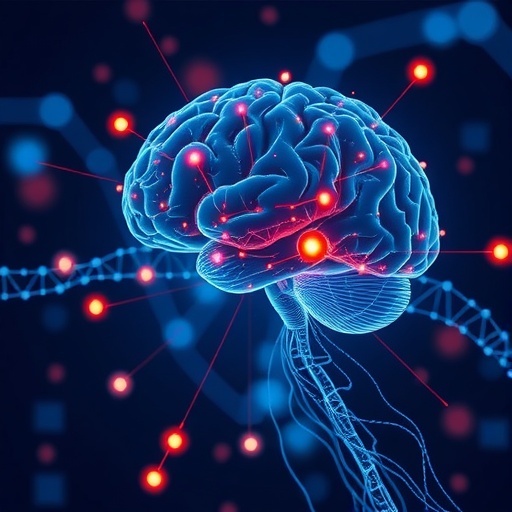In the realm of healthcare, the early detection of Alzheimer’s disease and related dementias remains an elusive goal, particularly within the confines of primary care practices. The traditional model of patient interaction, characterized by limited time availability for clinicians and competing demands for attention, often leads to a significant underdiagnosis of these neurological conditions. Moreover, the stigma surrounding Alzheimer’s and dementia further complicates the landscape, hindering both patient and clinician from openly addressing possible cognitive decline. In light of these challenges, innovative solutions are urgently needed.
Recently, a breakthrough study has demonstrated that the integration of digital technology and artificial intelligence can revolutionize how dementia is detected within primary care settings. Researchers from notable institutions, including the Regenstrief Institute and the Indiana University School of Medicine, have embarked on an ambitious clinical trial that seeks to address these diagnostic gaps. Testing a novel hybrid approach that combines the Quick Dementia Rating System (QDRS) and a digital AI marker, the study involves over 5,000 patients, with remarkable outcomes highlighting the potential to enhance detection rates significantly.
The QDRS is a user-friendly, patient-reported tool comprising only ten questions. It empowers patients and their families to convey cognitive changes while easing clinician burdens. When paired with the AI tool developed at Regenstrief, which employs machine learning to sift through electronic health records, the efficacy of early dementia detection is dramatically improved. The passive digital marker identifies key indicators linked to dementia, providing vital information without demanding extra time from healthcare providers.
This intelligent system has evolved over a decade with the concerted efforts of Research Scientist Malaz Boustani and his team. Their assertion of this AI tool being scalable and inexpensive is revolutionary; it places no additional financial strain on healthcare facilities and requires no further clinician input — a stark contrast to conventional methods which frequently require significant clinician time.
The substantial findings from the trial present a clear narrative: integrating these tools into standard care protocols yields a staggering 31% increase in the diagnoses of Alzheimer’s and other forms of dementia compared to usual practices. Furthermore, the insights gleaned from the AI-driven evaluations prompted a notable 41% uptick in follow-up assessments such as neuroimaging and cognitive testing, a clear sign of earlier intervention possibilities. This approach represents an evolution in how we can effectively address cognitive decline in populations often overlooked by contemporary healthcare.
Embedded seamlessly within existing electronic health record systems, the study introduced these tools directly into the workflows of the primary care environment. This design ensures that patients aged 65 and older are automatically invited to complete the QDRS survey through their patient portals. Concurrently, the digital marker continuously scrutinizes clinical data to flag high-risk individuals. As a result, clinicians are only prompted for further evaluation when warranted, drastically minimizing the burden on their time and resources.
Dr. Boustani emphasizes the encompassing equity this digital dual approach provides. By scaling early detection capabilities across diverse patient demographics, it effectively levels the playing field for access to care. This is especially crucial for vulnerable populations who might otherwise remain undiagnosed due to systemic barriers in healthcare delivery.
Furthermore, the implications of this study reach beyond mere detection metrics. By introducing accessible digital methodologies that are devoid of manual complications, the researchers are advocating for a systemic overhaul in how healthcare practices can approach dementia diagnosis. The infusion of technology offers an avenue for streamlined processes and enhanced patient outcomes, thereby reshaping the narrative surrounding dementia care.
The implementation of the QDRS and the passive digital marker heralds a significant shift in healthcare paradigms—one that values both technological innovation and patient-centered care. This research exemplifies how integrating these tools into standard practice can yield not only considerable diagnostic gains but also ensure broader accessibility to healthcare services for populations that are historically underserved.
As the world of healthcare continues to navigate the complexities associated with aging populations, this study exemplifies the potential for harmonious relationships between technology and human compassion. It reinforces the necessity for ongoing conversations surrounding dementia, encouraging patients and providers alike to confront cognitive changes openly and without stigma.
The digital detection of dementia marks a significant stride towards better management and understanding of cognitive health. The ongoing utilization of AI and patient-reported outcomes underscores a transformative moment in healthcare, illustrating how innovative solutions can yield practical and scalable advancements in everyday clinical practice.
Dr. Boustani’s work, solidified through this clinical trial, marries over five decades of insight in digital health data science to compassionate healthcare delivery, signifying a bright horizon for dementia care. As research continues to evolve, it will be imperative for healthcare systems to proactively adopt these methodologies to enhance patient outcomes and operational efficiencies, fostering a community approach to combating the challenges posed by Alzheimer’s disease and similar conditions.
Ultimately, this study and its findings serve as a catalyst for future research endeavors, encouraging a reevaluation of how dementia is approached in clinical settings. It stresses the importance of technological integration as a means of not only improving diagnosis rates but also of fostering a more inclusive healthcare experience for all patients, particularly the elderly and their families.
Subject of Research: Digital detection of dementia using artificial intelligence in primary care settings.
Article Title: Digital Detection of Dementia in Primary Care: A Randomized Clinical Trial
News Publication Date: 10-Nov-2025
Web References: JAMA Network Open
References: N/A
Image Credits: N/A
Tags: AI in healthcareartificial intelligence in neurologyclinical trials in dementia researchdigital tools for dementia diagnosisearly detection of Alzheimer’senhancing detection rates for dementiainnovative dementia detection methodspatient-reported cognitive assessmentprimary care challenges in dementiaQuick Dementia Rating Systemreducing stigma in Alzheimer’s diagnosiszero-cost healthcare solutions





